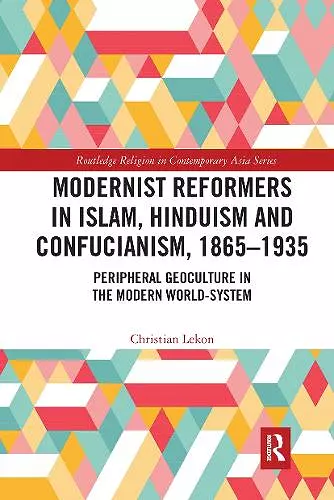Modernist Reformers in Islam, Hinduism and Confucianism, 1865-1935
Peripheral Geoculture in the Modern World-System
Format:Paperback
Publisher:Taylor & Francis Ltd
Published:18th Dec '20
Currently unavailable, and unfortunately no date known when it will be back
This paperback is available in another edition too:
- Hardback£145.00(9781138187719)

This volume presents a comparison of seven major religious reformers of the late nineteenth and early twentieth centuries: For Islam, Jamal ad-Din al-Afghani, Muhammad ‘Abduh and Muhammad Rashid Rida; for Hinduism, Dayananda Sarasvati and Swami Shraddhananda; for Confucianism, K’ang Yu-wei and Liang Ch’i-ch’ao. Each of these reformers attempted to bring a major world religion in line with global modernity by creatively reinterpreting the traditions on which this religion was based. The book outlines the lives and major ideas of these reformers, highlights the similarities between them, interprets their agenda as expressions of peripheral geoculture (centrist liberalism, antisystemic movements, positivism) in line with the Modern World-System (MWS) approach and links them with their ‘fundamentalist’ successors from the mid-twentieth to the early twenty-first centuries. This way, the author seeks to redress the Eurocentric bias that sometimes sneaks into the MWS perspective.
While there are numerous studies dealing with each of these reformers, the original contribution of this book is to provide a systematic comparison between them and to interpret them within a larger theoretical framework. It will be of interest for scholars and students working on issues related to religion, modernity and historical sociology.
ISBN: 9780367730505
Dimensions: unknown
Weight: 430g
222 pages